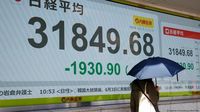Global stock markets fell sharply on Monday, April 7, 2025, as escalating trade tensions between the United States and China sparked renewed fears of a global recession. The London Stock Exchange's FTSE 100 index plummeted by 6%, marking its steepest decline since February 2024, while Germany's DAX index suffered an even greater drop of nearly 10% at the opening of trading.
The FTSE 100 fell by 488 points to close at 7566, its lowest level in over a year. This decline was exacerbated by a broad sell-off in banking and mining stocks, with every share in the index ending in negative territory. Notably, Rolls-Royce shares slumped by 13%, while Barclays and Lloyds Banking Group saw their shares drop by 7% and 5%, respectively. The banking sector, already under pressure from expectations of lower interest rates, faced particularly steep losses.
"The best panacea for financial markets right now would be a pause or reversal from the US on its tariff programme," said Kathleen Brooks, research director at XTB. The global market turmoil was largely triggered by President Donald Trump's aggressive tariff policies, which he described as "medicine" for the economy. His administration's recent announcement of tariffs, including a 20% levy on European imports and a 34% tariff on Chinese products, has raised concerns about potential retaliatory measures and their impact on global trade.
As trading began on Monday, the DAX index in Frankfurt fell by around 10%, reaching 18,489 points. This marked a significant downturn, following a week of volatility in response to Trump's tariffs. Other European markets followed suit, with France's CAC losing 6.6% and Italy's FTSE MIB falling by 5.7%. The regional Stoxx 600 index, already reeling from its worst week in five years, slid further into negative territory.
In Asia, stock markets continued to bleed, with the Hong Kong stock exchange closing with a staggering 13.22% drop, its worst one-day tumble since the 1997 Asian financial crisis. The Hang Seng Index fell 9.3%, while the Shanghai Composite Index lost 4.4%. Japan's Nikkei index was down 8.15%, adding to a previous decline, as investors braced for further volatility.
China has announced its own retaliatory tariffs, set to take effect on April 10, which include a 34% tariff on US goods. This back-and-forth escalation has created a climate of uncertainty in global markets. Richard Hunter, head of markets at Interactive Investor, noted, "China is clearly in the mood for the fight, and with the world’s two largest economies at loggerheads, the result has been ugly for investors." The implications of these tariffs are particularly concerning for Germany, which relies heavily on exports to the US.
Friedrich Merz, Germany's likely next chancellor, has called for urgent action in response to Trump's tariffs. He emphasized the need for Germany to restore its international competitiveness swiftly. "The situation on the international equity and bond markets is dramatic and threatens to deteriorate further," Merz stated. He has urged for tax cuts, reduced red tape, and lower energy prices to bolster the economy.
The turmoil is not limited to Europe. In the United States, the futures market indicates that the S&P 500 is expected to slump by another 3.5% when trading begins, with the tech-focused Nasdaq index on track for a 4.5% tumble. Last week, the “Magnificent Seven” tech giants saw a staggering $1 trillion in market value erased in just one day, reflecting the broader market's anxiety.
In India, the benchmark Nifty index was down by more than 3.5% on Monday morning, while the key IT sector suffered a decline of over 5.5%. Despite these challenges, Indian officials remain optimistic about achieving projected growth rates for the financial year, citing low oil prices as a potential stabilizing factor.
As the EU trade ministers convene to discuss their response to Trump's tariffs, the stakes are high. The ongoing trade war has already begun to impact global supply chains, with many countries seeking negotiations to mitigate the damage. However, the aggressive stance taken by the Trump administration has left many wondering whether a resolution is possible.
Daniel Kral, a macro specialist at Oxford Economics, pointed out the potential for a flood of low-priced Chinese goods into the EU market as a consequence of the tariffs, which could severely impact Germany's industrial sector. This is particularly concerning given the country's reliance on exports, which are now threatened by the looming tariffs.
In conclusion, the global markets are facing tumultuous times as trade tensions escalate and fears of a worldwide recession loom large. Investors are left grappling with uncertainty as they await concrete actions from the US administration and responses from affected countries. The coming weeks will be critical in determining the trajectory of the markets and the global economy.








